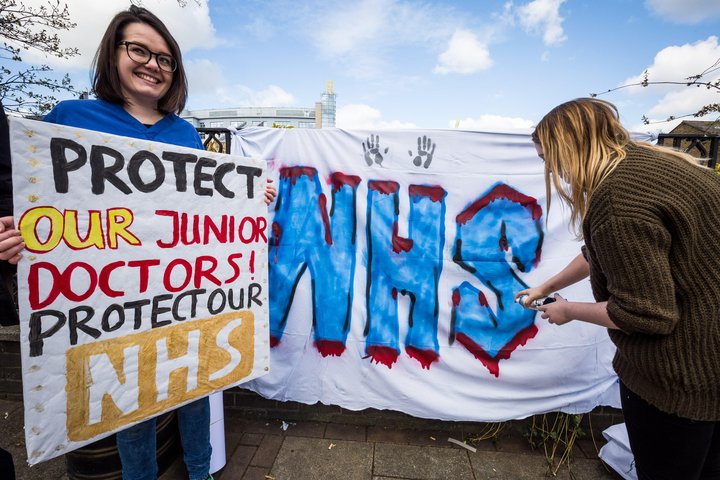Next month, junior doctors in England will walk out for three consecutive days after an overwhelming majority voted to strike over pay and conditions. Just under 50,000 doctors were entitled to vote in the British Medical Association ballot, and 78 per cent did. Of the votes cast, 98 per cent voted in favour of strike action.
The term ‘junior doctor’ refers to newly qualified foundation doctors, as well as all those doctors ranked in between, up until and including senior registrars. These doctors are hoping for a 26 per cent pay rise – a figure they say would amount to ‘full pay restoration’ after the BMA concluded that junior doctors have seen their real-terms wages fall ‘by more than a quarter’ since 2008. A doctor in their first year of training in England starts on a base rate of £29,384, which many say is not adequate remuneration for the long hours and strenuous shift patterns they have to work.
The BMA’s argument for strike action is that better working conditions would lead to staff retention – and ultimately an improvement on the current state of the NHS.
On top of this, medics have spoken out about the working conditions within hospitals having worsened. Last year, it was revealed that seven per cent of junior doctors leave the profession within their first three years of graduation. A more recent survey by the BMA found that 65 per cent of respondents had ‘actively researched’ leaving their jobs in the past year. Another poll found that four in ten junior doctors plan to leave the NHS as soon as they can find another job, while a third said that they want to leave the country within the next year to work abroad.
Last night’s result is a huge victory for the BMA. Dr Vivek Trivedi and Dr Robert Laurenson, co-chairs of the Junior Doctors’ Committee – a branch of the BMA – released a joint statement in which they thanked those who had voted ‘Yes’ for ‘making the case to other colleagues’ and ‘voting for your future’. Dr Laurenson said: ‘We are going to take this mandate and make it count. The excuses, lies and threats will no doubt continue coming out from Westminster. But make no mistake, this is a result the government cannot ignore. The government is not an immovable object, but we are an unstoppable force.’
Sir Julian Hartley, Chief Executive of NHS Providers, told BBC Breakfast this morning that ‘junior doctors represent a crucial part of the NHS workforce’. He added: ‘We really do need to see a resolution to this spiralling industrial action, not least because of the huge disruption for patients.’
The mix of staff shortages and delayed discharges in UK hospitals mean that the patient experience is dramatically worsening, too. Hospitals are increasingly congested; patients are often unable to be admitted to the right wards while issues with social care mean that patients who no longer need hospital treatment – but do require care in the community – can’t safely leave their wards. The BMA’s argument for strike action is that better working conditions would lead to staff retention – and ultimately an improvement on the current state of the NHS.
In 2019, there was a little movement in doctors’ pay. The government and the BMA agreed that annual pay increases of 2 per cent would be applied across a four-year period, leading to a hike of 8.2 per cent between 2019/20 and 2022/23. But after rising inflation and the ongoing cost-of-living crisis, doctors have labelled the latest 2 per cent increase ‘insulting’. Andrew Meyerson, a junior doctor working in A&E in London told BBC Breakfast: ‘We’re not asking for a crazy amount of money. We’re asking to be able to afford to live in this country, to afford to be able to pay our bills and to afford to continue working in the jobs that we absolutely love. I wish that we don’t see another day of strike action in the NHS.’
A wage increase of 26 per cent is certainly a tall order, though many doctors argue that it is not only fair, but necessary. But will the public remain on side? While Britons have been sympathetic to workers during the past six months of industrial action, there have been concerns that doctors may not receive the same treatment – particularly as they are generally perceived to be higher earners. One doctor told me that they hope the public will understand the exhausting shifts medics are expected to work, and to realise that if there is no movement from the government on pay, the number of doctors is likely to decrease further. However, many non-medics have voiced confusion at the request for a 26 per cent rise, given that nurses in England haven’t managed to secure 19 per cent – while a comparably low 7.5 per cent increase has been accepted by some nursing unions in Scotland.
Other doctors have voiced concerns that these strikes may not result in the ‘right type of changes’; namely that compromises may introduce more bureaucracy – for example, by trying to enforce breaks at certain times, as happens with nurses – rather than achieving tangible changes in pay and working conditions. Perhaps they are reading between the lines in Steve Barclay’s response to the vote for industrial action yesterday. The Health Secretary said that he was ‘deeply disappointed’, but that he had met with medical unions ‘to discuss what is fair and affordable, as well as wider concerns around conditions and workload’.
Now that industrial action in England has been confirmed, junior doctors in Wales and Scotland are starting to consider whether they too will strike. No one is quite sure what the outcome of the strikes will be. But for the precarious state of the NHS, it’s clear they are not good news.







Comments